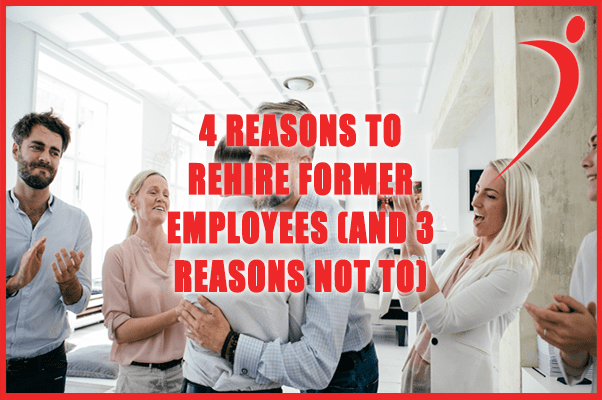
Would you rehire an employee who left your company voluntarily? Before you answer, consider today’s hiring climate. With more open positions than workers to fill them, the job market favors candidates who can afford to be picky about the companies they work for. That doesn’t mean companies are at the mercy of indecisive former employees, but it does mean you should pause before you say no to a rehire.
The disinclination to rehire former employees is gradually changing. Three out of four HR professionals are more likely to consider such hires now than they were in the past, and two out of three managers agree. That’s because bringing former star players back to your team carries a lot of benefits. These people know your company well and you know them. There’s a lot to be said for going with a sure thing over a gamble. Still, rehires may carry baggage that will affect their performance and that of others around them.
So, how do you know when hiring a former employee is a smart move? Let’s take a look at the pros and cons.
The Pros: How Hiring Former Employees Benefits Your Team
In a competitive talent market, leaving a position for more pay or better opportunities doesn’t necessarily make an employee disloyal to your organization. Maintaining positive relationships with former employees can open the door for mutually beneficial future opportunities. Here are four ways your company benefits from boomerangs:
- Reduced Onboarding and Ramp Up Times – People who have worked with you before already know your culture and policies. They know what they’re signing up for, and it won’t take them as long to integrate into your team. In addition, you already know their strengths and weaknesses so you can help them hit their stride sooner.
- Lower Recruiting Costs – Many companies have begun implementing alumni programs to stay connected with former employees. These connections can be an excellent source of passive candidates who may be willing to return to your company, especially if you parted ways amicably. Reaching out to people you know well can reduce your recruiting costs, and these individuals will also require less training resource investment than brand new hires.
- Skills Growth – When a former employee returns to your organization, you enjoy the benefit of the growth they experienced while they were away. Not only do you already know what skills they bring to the table, but they can also apply newly acquired knowledge to your culture and workflow.
- Brand Ambassadors – If an employee chooses to return to your company after spending time away, it’s likely that they did so because there is something they love about working with you. Whether it’s the culture, the people, or the benefits, these employees can become excellent brand ambassadors. It’s also helpful for current employees to see that the company maintains positive relationships with employees who decide to leave.
The Cons: When a Former Employee Isn’t the Right Choice
Of course, not every former employee is a good choice for a rehire. Some employees have left on bad terms or they simply carry too much baggage. If that’s the case, proceed with caution or not at all. Here’s when you should tap the brakes:
- Past Frictions – If an employee left your organization with lingering resentment or relationship issues, it will likely be difficult for them to feel engaged and productive upon being rehired. It’s always a good idea to revisit the exit interview to understand the reasons a former employee left if you are considering a rehire.
- Questionable Reliability – If an employee left after a short time with your company, there may be questions about his or her reliability in the future. Will they pack up and leave again if a better offer comes along? The flip side to this concern is that if the employee chose to come back, it could indicate that they liked working with you and will be more likely to stay for the long term in the future.
- Team Morale – Even if the employee is returning under the best of circumstances, others on the team may feel a certain level of distrust or question the person’s motives for returning. That’s even more likely to occur if the returning employee displays feelings of entitlement or expects special treatment because of their previous relationship with the company.
The Key to Successful Rehiring
While rehiring can be an excellent decision for your company, it’s also true that the least risky option isn’t always the best choice. New hires may be a better fit for many reasons including their ability to bring valuable new perspectives to your team.
The key to successful rehiring is to follow your standard interview and hiring process. It’s tempting to rush the interview or make a snap judgment based on prior history, but that would be a mistake. Instead, make sure the candidate has the skills you need and ask them all the same questions you would ask any other candidate for the position. Find out why they left their most recent job, explore their experiences and knowledge base, and determine whether they can add value to your team.
It’s also beneficial to leverage your exit interview process to cultivate ongoing relationships among employees who leave. A positive exit process ensures that a majority of exiting employees leave on good terms, leaving the door open for future opportunities.

